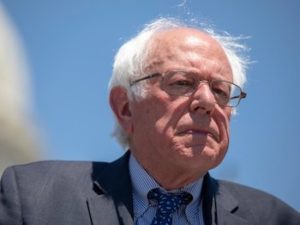
Bernie Sanders
*Bernie Sanders was born on this date in 1941. He is a white Jewish-American (former) civil rights activist and politician from Brooklyn, New York City. Bernard Sanders’ father, Elias Ben Yehuda Sanders, was born to a Jewish family in Słopnice, Galicia, in Austria-Hungary (now part of Poland). In 1921, Elias immigrated to the United States to become a paint salesman. His mother, Dorothy Sanders Glassberg, was born in New York City to Jewish immigrant parents from Poland and Russia.
Sanders became interested in politics early on, "Adolf Hitler won an election in 1932. He won an election, and 50 million people died as a result of that election in World War II, including six million Jews. So, what I learned as a little kid is that politics is, in fact, very important." In the 1940s, many of his relatives in German-occupied Poland were murdered in the Holocaust.
Sanders lived in Midwood, Brooklyn. He attended elementary school at P.S. 197 in Brooklyn, where he won a borough championship on the basketball team. He attended Hebrew school in the afternoons and celebrated his bar mitzvah in 1954. Sanders attended James Madison High School, also in Brooklyn, where he was captain of the track team and took third place in the New York City indoor one-mile race. In high school, he lost his first election, finishing last out of three candidates for the student body presidency. Not long after his high school graduation, his mother died at 46. His father died a few years later, on August 4, 1962, at 57.
Sanders studied at Brooklyn College for a year in 1959 before transferring to the University of Chicago and graduating with a Bachelor of Arts in political science in 1964. While there, he joined the Young People's Socialist League (the youth affiliate of the Socialist Party of America) and was active in the Civil Rights Movement as a student for the Congress of Racial Equality (CORE) and the Student Nonviolent Coordinating Committee (SNCC). Under his chairmanship, the university chapter of CORE merged with the university chapter of the SNCC. In January 1962, he protested the University of Chicago administration building to protest the president's segregated campus housing policy. He and 32 other students entered the building and camped outside the president's office. After weeks of sit-ins, the University of Chicago ended official racial segregation in private university housing in the summer of 1963. He once spent a day putting up fliers protesting police brutality, only to eventually notice that Chicago police had shadowed him and taken them down.
Sanders attended the 1963 March on Washington for Jobs and Freedom, where Martin Luther King, Jr. gave the "I Have a Dream" speech. That summer, he was fined for resisting arrest during a demonstration in Englewood against segregation in Chicago's public schools. In addition to his civil rights activism, Sanders was active in peace and antiwar movements while attending the University of Chicago. He applied for conscientious objector status during the Vietnam War; his application was eventually turned down, by which point he was too old to be drafted. Although he opposed the war, Sanders never criticized those who fought in it, and he has long been a strong supporter of veterans' benefits. He was briefly an organizer with the United Packinghouse Workers of America while in Chicago. He also worked on the reelection campaign of Leon Despres, a prominent Chicago alderman who opposed Mayor Richard J. Daley's Democratic Party machine. During his student years, Sanders read various American and European political authors, from Thomas Jefferson, Abraham Lincoln, and John Dewey to Karl Marx and Erich Fromm.
He has been married twice and also has seven grandchildren. After graduating from college, Sanders returned to New York City as a Head Start teacher, psychiatric aide, and carpenter. In 1968 he moved to Stannard, Vermont, within Vermont's extremely rural "Northeast Kingdom" region, because he had been "captivated by rural life." While there, he worked as a filmmaker and writer, creating and selling "radical film strips" and other educational materials to schools. He also wrote several articles for the alternative publication The Vermont Freeman. He lived in the area for several years before moving to the more populous Chittenden County in the mid-1970s. Sanders began his electoral political career in 1971 as a member of the Liberty Union Party, which originated in the anti-war movement and the People's Party.
As an independent, he was elected mayor of Burlington in 1981 and reelected thrice. He won the U.S. House of Representatives election in 1990, representing Vermont's at-large congressional district; he later co-founded the Congressional Progressive Caucus. He served as a U.S. Representative for 16 years before being elected to the U.S. Senate in 2006; he was re-elected to the Senate in 2012 and 2018. Polling conducted in 2011 by Public Policy Polling found that Sanders's approval rating was 67% and his disapproval rating 28%, making him then the third-most-popular U.S. senator. The NAACP (National Association for the Advancement of Colored People) and the NHLA (National Hispanic Leadership Agenda) have given him 100% voting scores during his tenure in the Senate.
In 2015, he was named one of the Top 5 of The Forward 50. In a November 2015 Morning Consult poll, he reached an approval rating of 83% among his constituents, making him the most popular U.S. senator. Fox News found him to have the highest net favorability at +28 points of any prominent politician in its March 2017 poll. He ranked third in 2014 and first in both 2015 and 2016. In 2017, a nationwide Harvard-Harris Poll found that Sanders had the highest favorability rating among the political figures included in the poll, a standing confirmed by subsequent polling.